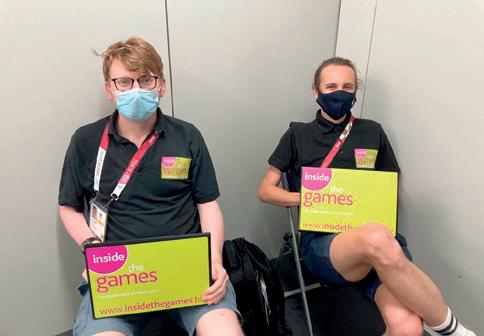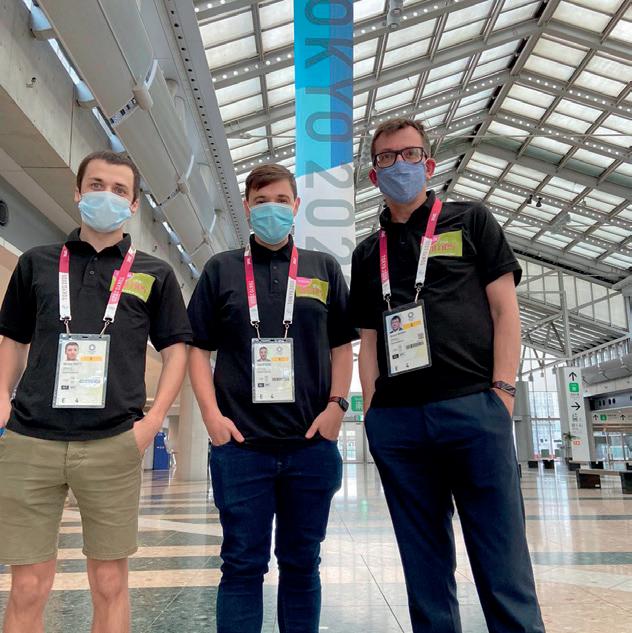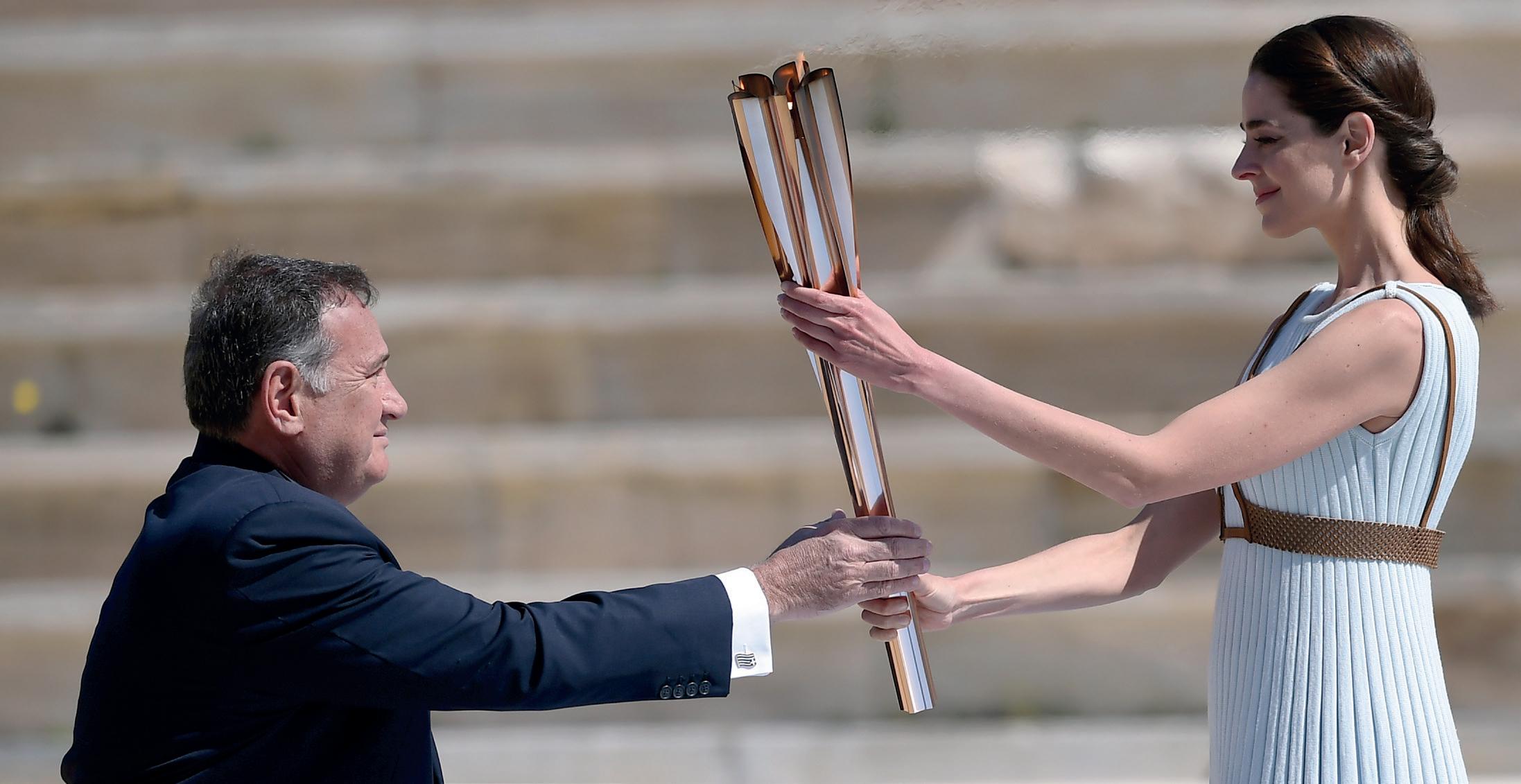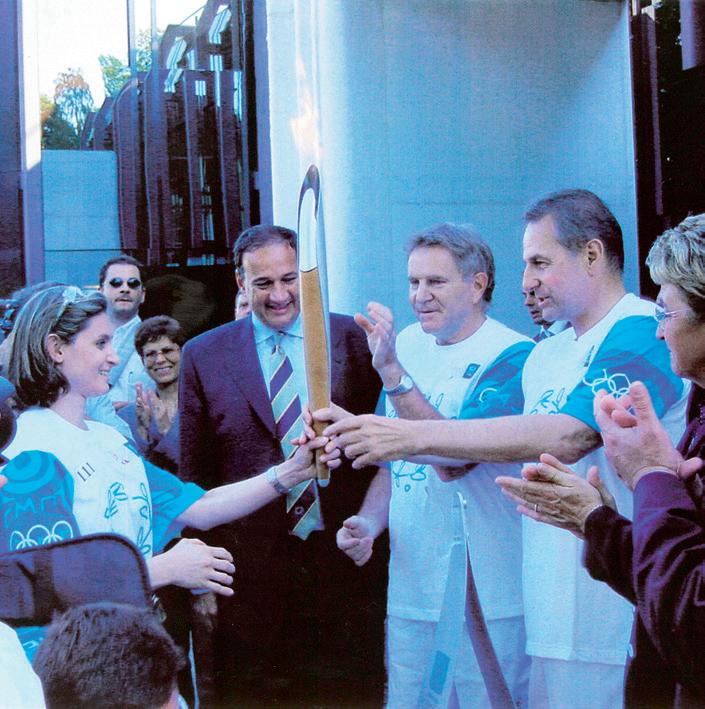
13 minute read
Introduction
DUNCAN MACKAY EDITOR, INSIDETHEGAMES

Advertisement

After the unprecedented turmoil and an Olympic and Paralympic build-up like no other, Tokyo 2020 is finally in the history books.
The sporting world had to wait an extra year to gather in the Japanese capital, and when it did the fans were forced to stay at home.
We knew from the start that Tokyo 2020 would be very different Games, and that proved to be the case.
It was not just the empty venues that made us feel that things were not quite right.
The obstacle course of COVID-19 checkpoints at the airport, the regular need to spit into a tube and the daily submission of health information reminded us that this was going to be a strange experience.
A lot of us, I'm sure, would appreciate never hearing the phrase "activity plan" again and I doubt anyone will miss using the dreaded OCHA app.
With strict rules in place, most people saw much more of their hotel room than they would normally have liked. Some, such as our very own Philip Barker, unluckily came into close contact with a positive case and were confined for up to a fortnight.
There was not the same mingling with friends from overseas, and the chance to properly absorb yourself into the host city - where there was hardly any Olympic dressing - was gone.
But despite this, the Games still reached their conclusion when some doubted that they would last the course.
The sport was fantastic, and the pandemic was largely kept at bay. Tokyo 2020 did not become the super-spreader event critics feared it might be, and the Games did not have one huge story of controversy which dominated the news agenda for days.
All of this will have left the International Olympic Committee breathing a huge sigh of relief. After the historic delay of the Games by a year, it must feel that it has emerged from a hugely challenging period largely unscathed.
In this latest October edition of The insidethegames.biz Magazine, the eightstrong team that we sent to Tokyo relive their experiences of this year’s Olympics and Paralympics.
The Olympic Movement can now look forward, with the Beijing 2022 Winter Olympics and Paralympics due to take place in February and March - a gap of just six months after Tokyo 2020.
With a political cloud still hanging over the event in the Chinese capital, chief senior reporter Liam Morgan assesses the latest situation with the IOC guaranteed to face some difficult questions in the coming weeks.
Beijing 2022 will be on the agenda at the Association of National Olympic Committees General Assembly in Crete in October.
Senior reporter Michael Pavitt speaks to Robin Mitchell, the Fijian who has served as the Acting President of ANOC since 2018 due to the legal difficulties faced by Sheikh Ahmad Al-Fahad Al-Sabah.
With Sheikh Ahmad now appealing a prison sentence handed down by a Geneva court for alleged forgery, it is a period of more uncertainty for both Mitchell and ANOC.
As the General Assembly is taking place in Greece, chief columnist David Owen has spoken to Spyros Capralos, the President of the Hellenic Olympic Committee who has now risen to become the Movement’s top official in Europe.
Sticking with the Greek theme, Philip, our historian, has looked back on the key meetings which have taken place in the country - the birthplace of the Games - over the years.
The 2022 sporting calendar is already looking packed - with cities called Birmingham on both sides of the Atlantic due to host major events.
Mike Rowbottom looks ahead to The World Games in the United States - and the Commonwealth Games in England - which will both take place under the name Birmingham 2022.
It will also be a big year for the International Boxing Association, which still finds itself under huge pressure from the IOC after being shut out of the Tokyo 2020 competition.
Umar Kremlev, the AIBA President, speaks to Mike as the embattled organisation bids for reacceptance in order to regain its place for Paris 2024.
The sports of aquatics, ice hockey and skiing will all have new Presidents in 2022 for the first time in a long time.
Alongside magazine editor Dan Palmer, I have taken a look at these governing bodies as they change the guard and look ahead to the future.
Although Tokyo 2020 has ended, there is still plenty to get our teeth into and insidethegames will be there every step of the way to bring you the stories which matter.
Enjoy the magazine.

Duncan Mackay
Editor





EUROPE’S TOP MAN

Spyros Capralos became Europe’s most senior Olympic official in June, and is currently the sole flagbearer for Greece at the IOC. David Owen meets the man from the birthplace of the Games.
Some sports are apt to produce prominent sports administrators. One of these is water polo.
One-time FIFA boss Joāo Havelange was a water polo player; so was Peter Ueberroth, deliverer-in-chief of the landmark Los Angeles 1984 Olympics; and so was Spyros Capralos, who represented Greece at both those LA 84 Games and previously at the Moscow 1980 Olympics.
When I ask the now President of the Hellenic Olympic Committee what it might be about this demanding team sport that accounts for this, however, he is keen to extend the credit across the sports spectrum.
“Water polo is a very dynamic sport,” Capralos tells me in a wide-ranging interview conducted after his return from Tokyo 2020. “You need to have many different skills to be able to survive above the surface of the water.”
But, he goes on, “every sport at high level provides you with a lot of skills”.
“If you can combine them with managerial skills, that can produce somebody who can be a good business administrator, a good sports administrator or combine both,” he adds.
Sport, Capralos says, is a “unique tool in the life of everybody, and high-level sport teaches you many things from a young age, especially hard work, discipline and motivation”.
“You also learn how to lose in order to learn later on how to win,” he says. “This is a good lesson for life.
“So it is not just water polo, it is sport in general.”
Four decades after those Moscow Games, and more than half a century after his first national swimming title in 1969, Capralos, 66, has worked his way up to become one of the top administrators in European and international sport.
He has been President of the most emblematic of National Olympic Committees since 2009.
But, in recent years, he has added membership of the International Olympic Committee - in 2019 - and, in June, the Presidency of the European Olympic Committees.
What is more, he has combined these increasingly onerous sports responsibilities with the chairmanship of Star Bulk Carriers, a Nasdaq-listed shipping company. This came after earlier business roles in the financial sector.
On October 24 and 25, Capralos’ chief preoccupation will be Crete’s hosting of the General Assembly of the Association of National Olympic Committees.
In an example of the flexibility required of all decision-makers as a consequence of the COVID-19 pandemic, it was decided to move the event from Seoul only in July, following a meeting in Tokyo of the ANOC Executive Council. The General Assembly had already been postponed from last year and was initially planned for Athens, before the Mediterranean island was chosen.
DAVID OWEN CHIEF COLUMNIST, INSIDETHEGAMES

“When we were asked by ANOC whether we could help, we offered to provide a solution,” Capralos recalls.
“Greece is always there when we can to provide solutions because we felt the need again for many of the people in the ANOC world - 205 National Olympic Committees - to be able to meet each other.
“Of course not everybody will be able to come to Greece, but I think it will provide the possibility for many people to be together again and, hopefully, while following strict health control conditions, we will be able to exchange information about the Tokyo Olympic Games and talk about the future.”
In preparing for the event, Capralos and his colleagues will have been helped by the experience of staging another General Assembly - the meeting of the EOC in June when the Greek official was elected as the body’s ninth President, beating Danish rival Niels Nygaard.
Capralos refers to the EOC gathering as “the first major sports event attended by people in person” since COVID.
He adds: “We had 46 out of 50 European countries who attended in Athens and they were all so happy to be together.
“It was great because the 50 countries of Europe were able, in their big majority, to be in Athens and celebrate that we were together after such a long time when nobody was allowed to travel.
“The good thing is that everything worked out well with no COVID cases. We took all the strict measures that we needed to.”
When I ask more generally about the challenges of managing through a pandemic, Capralos observes that the situation “taught us all how important it is to be patient, flexible”.
“I think under the difficult circumstances of COVID, we also learnt to understand other people better,” he claims.
“We learnt how to fight together against this common threat, trying to get close to normality.
“Tokyo was a unique experience for everybody because there we managed to be all together to benefit the athletes of the world who had been trying very hard to qualify for years.
“The only thing that I have to express after the Games is great gratitude to the IOC and the Tokyo Organising Committee, and to the Japanese people in general and the Government, for working day and night under difficult conditions to provide the Olympic Games in a safe and secure manner despite all the difficulties they faced.” The pandemic put paid to Athens’ chances of hosting the key 2021 IOC Session, and hence providing a highly symbolic backdrop to Thomas Bach’s re-election as IOC President.
The very considerable consolation is that the Greek capital will instead host the 2025 Session and hence, barring a change in the rules, the election of Bach’s successor. “It is even more important [than 2021],” Capralos acknowledges. “I think the eyes of the whole world will be on Greece at that time because there is going to be a new President.” Capralos’ own election as an IOC member in Lausanne in 2019 brought to an end a four-year period during which Greece, the ancient cradle of Olympism, had no IOC member. The occasion brought out an emotional side of him that is usually kept hidden. “Those were moments I will never forget because that was one of the most important moments in my life,” he explains. “Having been in sport all my life, that moment was the maximum of my career.
“It was just that people recognised my presence and what I have contributed to sport and the Olympic Movement.
“That is why I was so moved. And because that meant the recognition of my colleagues and everybody in the sports world, and I felt their warmth and happiness.” It was a moment, moreover, which Capralos’ family was in Switzerland to witness.
“All of my family love sports”, he says, although none have taken an active involvement in the Olympic Movement like he has.
His father played basketball, but not at a high level. His daughter is, he says, “passionate about the Olympic Games and sport. Her biggest regret was that she was not able to come to Tokyo”. His election to the IOC also signified that he could put an episode in 2012, when he was criticised by the IOC’s Ethics Commission in the wake of a newspaper investigation into Olympic ticket sales, firmly behind him. When I ask Capralos to name one thing above all which he would like people to recognise he had achieved in the realm of sports administration, he mentions two. “I worked very hard for the success of the Athens 2004 Olympic Games,” he said.

Spyros Capralos, right, with International Olympic Committee President Thomas Bach, flies the flag for Greece at the IOC. Photo: Getty Images


DAVID OWEN CHIEF COLUMNIST, INSIDETHEGAMES


Europe's most senior Olympic official receives a Torch from a priestess at Ancient Oympia. Photo: Getty Images
“Either as an executive director of the Organising Committee or later on as secretary of state for the Olympic Games and city manager at Games time. That was one major achievement. “The other is that I took over the Greek Olympic Committee and I think that we have made a lot of progress.
“We have become financially independent by using our assets, by using our marketing efforts and by making a programme for the athletes which we call 'Adopt an Athlete', first on the way to Rio, and now to Tokyo.
“Trying to help the athletes financially in times when Greece is weak financially and the Greek state has reduced the funding of sport a lot.”
As chairman of the Coordination Commission for the Minsk 2019 European Games, few international sports officials can have had as many dealings as Capralos with Belarus.
Accordingly, it seems appropriate to ask if he is disappointed with the regime’s recent comportment. He answers carefully. “You know I was very close to Belarus because I worked very much with the Organising Committee for the organisation of the second European Games in Minsk, and I was chairing the Coordination Commission,” he said. “My task was to follow the progress of the works and the preparation for this great event for Europe.
“I can tell you that I didn’t have any issues working closely with the Belarusian Olympic Committee, the Organising Committee and everybody involved with the organisation of the event - and actually the event was a very successful one. “On the other hand, the IOC started investigating the NOC of Belarus and they concluded that the current leadership of the NOC of Belarus has not appropriately protected the athletes of Belarus from political discrimination within the NOC, their member federations or the sports movement. “This is definitely against the Olympic Charter and of course we heard about the story with Belarusian athletes in Tokyo. “Because all this is under investigation, I cannot make further comments on that.
“But, of course, we need to respect the Olympic Charter about political discrimination.” I also wanted to ask Capralos for his assessment of the terrible wildfires which swept through Greece this summer, skirting perilously close to Ancient Olympia and the International Olympic Academy. “We were all in Tokyo when the news came from Greece that the fires had happened and they were very close to Olympia and our facilities there,” he recalls. “We were very happy when we heard first of all that the Greek Prime Minister and Minister in charge were really focusing on Olympia and did their utmost so that Olympia, which is our cultural heritage, was not affected.” There was some luck when the wind changed direction at a certain moment.
“We were also very fortunate that the new fire extinguishing facilities paid for by the IOC were put in place and they also helped in extinguishing the fire,” Capralos added.
“So Olympia is intact - thank God.”
For all that, it was an extremely narrow escape. “I would say that it reached about 500 metres from the academy,” Capralos said. “And one kilometre from the ancient stadium.
“That was very close.” And good reason, one would have thought, for the consequences of global warming to feature prominently in discussions when Greece’s first ANOC General Assembly since 2004 begins.







